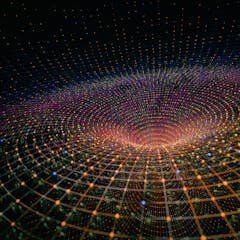
Articles on Astronomy
Displaying 221 - 240 of 802 articles

A new 3D film follows two children as they discover the astrophysical story of the universe and Yamaji stories of the sky and land. Making it was an extraordinary cross-cultural experience.

An astronomer’s guide to all the colours of the sky.

Scientists have a good estimate on the staggering number of stars in the universe.

The largest orbital telescope ever made will allow astronomers to study the atmospheres of alien planets, learn about how stars form in the Milky Way and peer into the farthest reaches of the universe.

Gravity, mass and centrifugal force all contribute to the final shape of a planet.

Preprints are scientific papers made available before being published in a peer-reviewed journal. The Australian Research Council has banned researchers from citing them in grant applications.

By studying the chemical makeup of binary stars, astronomers found many planetary systems are far less peaceful than ours.

The universe has a finite age — 13.8 billion years to be exact. So if it had a beginning, why is it so difficult to say for sure whether it will have an end?

Australia’s ASKAP radio telescope probes the Universe more deeply than ever before, revealing unseen features of the cosmos.

Excluding, silencing and discouraging so many brilliant minds carries a very heavy cost, not just to the women directly impacted, but to all of humanity.

Astronomers have taken a close-up look at the jets of plasma streaking away from a supermassive black hole - one of the strangest and most energetic features of galaxies.

Mars, Venus and the crescent Moon will all come together in the sky just after sunset on Tuesday.

The history of UFOs weaves together public fascination, government secrecy and cultural phenomena. Recent news and shifts in the government’s stance on UFOs are giving new life to the mystery.

The English astronomer and navigator Thomas Harriot died in 1621, leaving behind 8,000 pages of notes containing a trove of unpublished scientific discoveries.

Machine learning is helping astronomers unravel the vast amounts of data being collected.

Gravitational waves reveal the demise of super-dense neutron stars spiralling into their black hole companions - the first time such strange and exotic star systems have ever been observed.

As thousands of new satellites enter Low Earth Orbit, it’s important to consider their potential impact, including possible environmental damage in addition to hindering the work of astronomers.

Astronomers know a lot about what’s in outer space – and think it’s possible it never ends.

Fast radio bursts are the focus of a young and fascinating field of astronomy. Researchers just released data on more than 500 new bursts, quadrupling the total number of detected events.

Test out scientific ideas, connect with your ancestors or just marvel at the beauty of nature.
